Nepali
Incorporating Feedback from Your Mentor (Writing and Speaking)
Writing Feedback
Meeting with your mentor over video on Zoom or in person, if appropriate/safe/plausible, is incredibly helpful to receive feedback and incorporate it into your language learning. On Zoom, your language mentor is able to show you pictures or videos using the “share screen” function and, even more importantly” can show you the DEVANAGARI SPELLING FOR WORDS!!!! This is innumerable to the successful integration of your language mentor’s feedback into your practice. For my own writing and reading, I oftentimes send my writing over to my language mentor as a photo or Word Document. Then, he is able to provide feedback in live time by sharing his screen and I have my original work in front of me to track the changes. Here is an example of the process for my written outline presentation on Nepal’s education system. I will walk you through the steps I took from writing an outline to creating my presentation, all the while incorporating feedback from my mentor.
- A very rough outline for my presentation on the education system. I broke it into 5 parts and noted where I had questions on spelling or word choice.
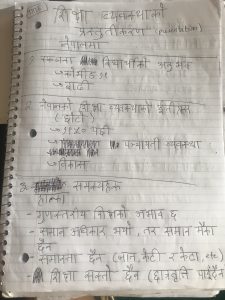
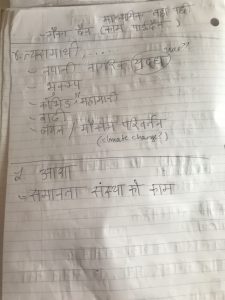
2. I rewrote the outline into a nicer draft to share with my language mentor.
3. I shared it with my mentor, and then we met in live time to go over his critiques and feedback. I highlighted where there were additions or minor edits made based on the feedback from my language mentor. He also suggested I add two other points to the “current problems” section in the presentation, which I appreciated!
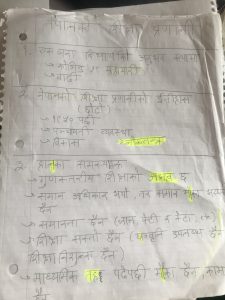
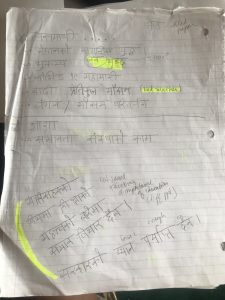
4. I began creating my presentation, incorporating the feedback from my language mentor. After writing the basic slides and editing the amount of text on the slides, I had to sit down and think about the SPEAKING and PRESENTATIONAL part. What would I say for each slide? This took a lot more time to reflect, and I wrote down questions that I had about certain vocabulary or grammar to discuss with my language mentor.
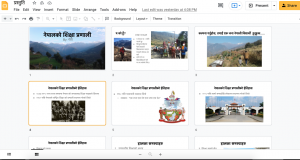
Notes on incorporating feedback:
- Here you can see one of the final slides I had, and incorporated feedback from my language mentor to mention “bad weather events” rather than just the flooding. This was a seemingly simple point of feedback, but it helped me structure my slides more clearly and provided more vocabulary for me as well, as I also included climate change events.
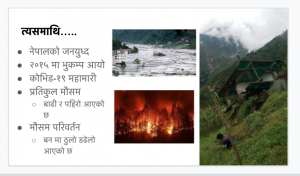
- I realized as I was building my slideshow that I should add an introductory slide about myself and why I am interested in learning more about the education system in Nepal. I did not run this specific slide by my language mentor, but I realized that I did not have any slides about my positionality in talking about the Nepali education system. So, this is a good example of taking an opportunity to challenge yourself and see how much you have learned by not “verifying” it with your language mentor right off the bat. Of course, I will seek my mentor’s feedback once my presentation is finished, but sometimes allowing yourself the space to try things on your own (and to build confidence!) can be a great learning opportunity.
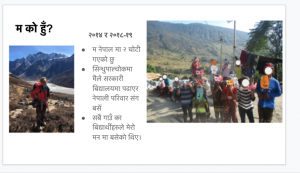
Speaking Feedback
I received very helpful feedback from my language mentor was when I was preparing to interview a student in Nepali. My mentor helped me write an interview guide with questions focused on their education experience throughout the COVID-19 pandemic. So, for speaking practice, we did a mock interview run-through. My mentor pretended to be a “student” (which initially made me laugh) and I asked him questions from the guide and follow-up questions accordingly. For this task, I recorded our mock interview so I could listen back to it later on, which was also very helpful. The feedback I received from my mentor was that I should:
- Read through the interview guide twenty more times to practice fluency with the questions
- Provide more “empathy” in my responses, or provide more sounds and signs that I was active listening
While these points were not specific feedback about my vocabulary or grammar, they really made me reflect on how I needed to immerse myself more into the language. Instead of hearing the Nepali, internalizing it, and moving on to the next question, I needed to absorb it and express my thoughts or reactions. This was incredibly helpful feedback. So, I would highly recommend doing role-play dialogues or interviews with your language mentor to receive feedback on how you are engaging with the language in context as well.

